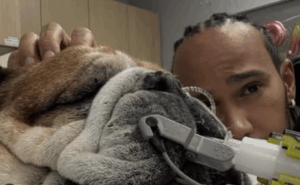Pet obesity in the US is honestly out of control. About 60% of dogs and cats are overweight, which is a staggering number.
This health crisis doesn’t just mean chubby pets—it leads to diabetes, heart issues, and shorter lives for millions of animals.
Scientists are working on new weight-loss meds for pets, inspired by drugs like Ozempic for humans. These could show up as early as 2028 or 2029.
The new drugs mimic hormones that regulate appetite and blood sugar, much like they do in people. I mean, who would’ve thought we’d get here?
The standout so far is OKV-119, a six-month implant being tested by biotech companies. It delivers medication through a tiny device under the skin.

This could give pet owners a real shot at helping their overweight pets reach healthier weights—of course, only if you pair it with decent food and some exercise. No magic fix, unfortunately.
Key Takeaways
- Almost 60% of US pets are overweight, which brings serious risks like diabetes and shorter lifespans.
- New weight-loss implants using Ozempic-like tech might arrive within three to four years.
- These treatments should work alongside, not instead of, a good diet and regular exercise.
Why 60% of Pets Are Overweight
Obesity in pets has reached an epidemic scale. About 60% of dogs and cats are now considered overweight or obese.
This isn’t just random—there are reasons behind it, and most pet owners can actually do something about them.

Rising Rates of Pet Obesity
The numbers keep climbing. Vets counted 100 million overweight or obese dogs and cats in 2022, up from 80 million five years earlier.
That’s a 25% jump in a pretty short time. Both dogs and cats are getting heavier at similar rates, so no one’s off the hook.
Current obesity statistics:
- 56% of dogs are overweight or obese
- 60% of cats carry extra pounds
- About 100 million pets are affected nationwide
It’s clear that lifestyle and environment matter a lot here. Many owners don’t even realize when their pets are packing on the pounds.
Health Risks Associated With Excess Weight
Overweight pets aren’t just a little sluggish—they face real health problems. Chubby dogs can live up to 2.5 years less than lean ones.
Cats get hit even harder. Overweight felines ages 8 to 12 have a 2.8 times higher mortality rate than their slimmer friends.
Major health problems include:
- Joint pain and arthritis
- Diabetes
- Heart disease
- Breathing issues
- Reduced mobility
- Higher surgical risks
These aren’t just expensive to treat—they make life less fun for pets. Who wants to see their dog struggle to play or go for a walk?
Underlying Causes of Weight Gain in Dogs
Lots of things can make pets gain weight, but overfeeding tops the list. Treats pile up, and portions get out of hand.
Common feeding mistakes:
- Free feeding—leaving food out all day
- Oversized portions—not measuring meals
- Too many treats—using food for every little reward
- Table scraps—sharing your dinner too often
Lack of exercise is a big one, too. Indoor pets just don’t move as much, especially if owners are busy or away at work.
Medical issues sometimes play a part. Thyroid problems can slow metabolism, and spaying or neutering changes hormones, making weight gain easier.
Older dogs also burn fewer calories, but their eating habits don’t always change with age. No surprise they gain weight as they slow down.
Understanding Ozempic and Weight-Loss Drugs for Dogs
GLP-1 receptor agonists like Ozempic work by copying hormones that manage appetite and blood sugar. Ozempic isn’t actually approved for dogs right now, but researchers are cooking up versions for pets.
How GLP-1 Receptor Agonists Work
GLP-1 stands for glucagon-like peptide-1, a hormone that shows up in both people and animals. It helps control blood sugar and appetite after eating.
These drugs basically imitate GLP-1, latching onto special receptors in the digestive system and brain.
Main effects include:
- Slowing digestion so pets feel full longer
- Turning down appetite signals to the brain
- Helping the pancreas release insulin when blood sugar spikes
- Stopping the liver from making too much glucose
The drug mimics GLP-1, curbing appetite. This leads to weight loss because pets just don’t feel as hungry and naturally eat less.
It’s not instant—weight comes off over weeks, as pets start eating smaller meals and snacking less.
Overview of Semaglutide, Exenatide, and Similar Treatments
Semaglutide is the main ingredient in Ozempic and Wegovy, both made for humans with diabetes or obesity.
Other GLP-1 drugs out there include exenatide, liraglutide, and dulaglutide. Each has its own dosing quirks and strengths.
Current GLP-1 medications:
| Drug Name | Active Ingredient | Typical Use |
|---|---|---|
| Ozempic | Semaglutide | Diabetes, weight loss |
| Wegovy | Semaglutide | Weight loss only |
| Trulicity | Dulaglutide | Diabetes |
| Victoza | Liraglutide | Diabetes, weight loss |
Scientists are building pet-specific weight-loss treatments using the same science as Ozempic and Wegovy. The new meds will be tailored for animals, not just recycled human drugs.
Dogs process medicine differently than people. Their livers, kidneys, and digestive systems don’t work at the same pace.
Current Status of Ozempic Use in Veterinary Medicine
Vets aren’t handing out Ozempic for dogs—at least, not yet. It hasn’t been studied enough in dogs, and the side effects could be risky.
Current diabetes care for dogs involves:
- Daily insulin shots
- Prescription diets
- Regular blood sugar checks
- Exercise routines
Most diabetic dogs have Type 1, so they don’t make insulin at all. Ozempic doesn’t work for Type 1 diabetes; those pets need actual insulin, not just appetite control.
Biotech companies are developing an implant that works like GLP-1 receptor agonists. These could show up at vet clinics by 2028 or 2029.
The new drugs will go through proper safety testing in dogs and cats. We’ll finally get real dosing instructions, not just educated guesses.
Don’t ever give your dog human Ozempic unless a vet says so. Dogs metabolize drugs differently, and what’s safe for you could be dangerous for them.
Emerging Treatments: OKAVA, OKV-119, and Ozempup
Right now, several companies are racing to create weight-loss meds for pets based on Ozempic-style science. Okava, a San Francisco biotech startup, is leading the charge with their drug OKV-119—sometimes called “Ozempup.”
OKV-119 Implant: How It Works in Dogs
OKV-119 is a tiny implant (not a weekly shot like in humans). Dogs get one implant that lasts for months—way less hassle.
The implant uses exenatide, a GLP-1 receptor agonist. It slows digestion and dials down appetite, so dogs feel full longer after eating.
Tests show OKV-119 causes healthy weight loss in overweight cats (at least in non-diabetic animals). It targets obesity and might even help prevent diabetes in pets.
The big perk? The implant delivers a six-month treatment in one go. No more weekly injections—just one quick procedure, and you’re set for half a year. That’s a relief for both pets and their people, honestly.
Role of Okava and Vivani Medical in Pet Health Innovation
Okava develops weight loss and appetite-suppressing drugs for dogs and cats. They focus on treatments that act much like human Ozempic, but for pets.
Vivani Medical works with Okava to create OKV-119. Their partnership grew in 2025 to tackle metabolic health and longevity in dogs.
Vivani brings medical expertise to the table, while Okava dives deep into pet-focused research. Together, they’re pulling human healthcare innovations into the world of animal medicine.
Leaner dogs tend to live over two years longer than heavier ones. Both companies feel OKV-119 could become a real game-changer for canine longevity.
Clinical Trials and Timeline for Availability
Scientists are now testing OKV-119 in clinical trials. They’re mainly checking for safety and effectiveness in overweight dogs and cats.
Expected Timeline:
- Current phase: Clinical testing
- Potential market availability: Maybe as soon as 2028
- Some reports say it could be here in three years
The trials look at how well the implant helps dogs lose weight safely. Researchers are also watching for any impact on diabetes prevention in pets.
Regulatory approval will set the final timeline. Okava and Vivani need to show their treatment actually beats current pet weight loss options.
Considerations and Cautions for Pet Owners
Pet owners thinking about weight-loss meds for their dogs face some big safety questions. These drugs aren’t approved for pets, so it’s smart to weigh the risks, possible benefits, and safer alternatives before making any decisions.
Potential Benefits of Weight-Loss Drugs for Dogs
Scientists are working on pet versions of drugs like semaglutide, which is the main ingredient in Ozempic. These treatments might hit the pet market within three years.
The drugs mimic GLP-1 hormones, helping regulate blood sugar and slow digestion. Dogs feel full longer and may eat less as a result.
Potential advantages include:
- Appetite suppression
- Better blood sugar control
- Reduced food cravings
- Support for portion control
But honestly, these benefits are still just theories when it comes to dogs. The current human GLP-1 drugs haven’t really been tested in canines.
The active ingredient semaglutide hasn’t been studied in dogs, so we don’t know if it’s safe or effective. Most diabetic dogs actually need insulin, not GLP-1 meds.
Possible Side Effects and Safety Concerns
Ozempic isn’t used in dogs because vets have no clue if it’s safe or works. Dogs process meds differently than people, which can get risky fast.
Common side effects may include:
- Vomiting and nausea
- Diarrhea or constipation
- Lethargy and weakness
- Loss of appetite
- Dehydration
There are bigger worries, too—Ozempic has links to pancreatitis and thyroid tumors in humans. Not great.
Medication mix-ups with pet and human drugs are happening more often these days. It’s worth keeping your pet’s meds separate from your own.
If your dog accidentally gets Ozempic, call your vet right away. Even a small dose can be dangerous for dogs.
Alternatives and Complementary Weight Management Strategies
There are safe, proven ways to help overweight dogs slim down. Vets often suggest prescription diets made just for canine weight loss.
Effective weight management options:
- Prescription weight-loss dog foods
- Measuring food portions with a kitchen scale
- High-protein, high-fiber diets
- Regular exercise routines
- Careful treat portioning
Many regular dog foods have fillers and additives that can pack on pounds. Switching to better-quality foods without the junk can make a difference.
It’s essential to work with a vet on any weight-loss plan. A good vet will check for hidden health issues and design a plan that’s actually safe and doable.
Don’t go overboard with exercise right away. Start with short walks and let your dog build up endurance as they lose weight and get fitter.
Frequently Asked Questions
It’s normal to have questions about weight loss meds and safe ways to help dogs with obesity. Veterinary science does offer clear answers on what’s approved and warns against using human medications in pets.
Is semaglutide (the active ingredient in Ozempic) safe for canine use?
Nope—semaglutide isn’t approved for dogs and hasn’t really been studied in canines. Dogs break down medications differently than humans, so human diabetes drugs can be risky for pets.
Never give a dog Ozempic or other human diabetes prescriptions unless a vet specifically says so. We just don’t know how these drugs affect dogs.
Vets avoid prescribing Ozempic for pets because of safety concerns. Human meds can cause vomiting, diarrhea, and dehydration in dogs.
What are the recommended treatments for obesity in dogs?
Special prescription diets for dogs are the safest bet for tackling obesity. These foods cut calories but still provide all the nutrients dogs need.
Measuring food portions is huge—most overweight dogs simply eat too much for their activity level.
More exercise helps burn calories, but it should match your dog’s current fitness. Slow and steady increases are best to avoid injury.
Regular vet check-ins make sure weight loss stays on track. A professional can tweak diet and exercise as needed.
How does weight management medication affect a dog’s metabolism?
Most diabetic dogs have Type 1 diabetes, so they need insulin—not drugs like Ozempic. Insulin replaces what their bodies don’t make.
GLP-1 meds like Ozempic work by slowing digestion and controlling blood sugar, but nobody really knows how this plays out in dogs. It could throw off their metabolism.
Dogs aren’t just small humans. Their bodies work differently, so meds made for people might not help—and could even hurt—canines.
Dog-approved weight loss meds use different methods than human drugs. They’re designed for how dogs’ bodies actually function.
What dietary changes should be considered for an overweight dog?
High-protein, high-fiber diets help dogs feel full with fewer calories. These diets support healthy weight loss without missing key nutrients.
Measuring portions is a must. Many owners don’t realize how much food they’re dishing out every day.
Cutting back on treats and scraps gets rid of sneaky extra calories. Treats shouldn’t be more than 10% of daily intake.
Feeding on a regular schedule helps keep metabolism on track. Consistent mealtimes support digestion and weight control.
Are there any side effects associated with using diabetes medications in dogs?
Human diabetes meds can make dogs vomit, have diarrhea, or act lethargic. These reactions can show up pretty quickly after exposure.
If stomach issues pop up, dehydration can get dangerous fast. Some dogs might need emergency fluids from the vet.
Blood sugar swings can be risky, especially for dogs with other health problems. Uncontrolled glucose changes aren’t something to mess with.
Some human meds cause pancreatitis in people, and they might do the same in dogs—but we honestly don’t know since studies are lacking.
What is the veterinarian’s role in managing a dog’s weight loss program?
Veterinarians look for underlying reasons behind obesity, like medical issues or hormonal imbalances. They use these findings to shape a treatment plan that actually fits the dog’s needs.
They keep an eye on the weight loss process to make sure it happens at a safe pace. Honestly, losing weight too fast can really mess with a dog’s health.
When necessary, veterinarians prescribe medications—say, insulin for diabetic dogs. They steer clear of using random human meds on pets, which just seems like common sense.
Regular check-ups give them a chance to tweak the diet or exercise routine. With a vet’s help, dogs have a much better shot at losing weight and keeping it off in the long run.










